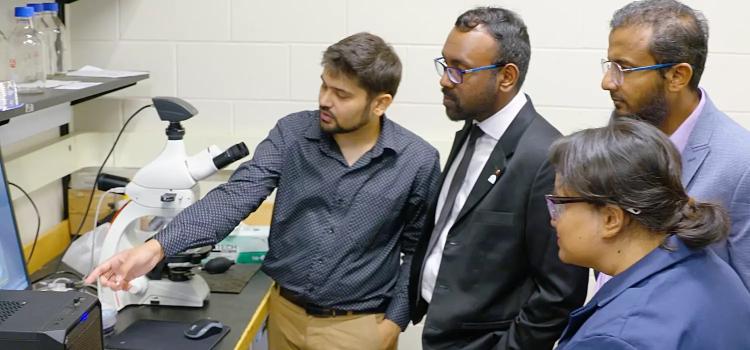
Shabab Saad, second from left, and Md Kibria, far right, with other members of the CarboMat team. Photo Credit: Trevor Alberts
Researchers from the Schulich School of Engineering have developed an innovative process to transform waste materials from oilsands production into high-value carbon fibres with applications across numerous industries.
Four years ago, with funding from Alberta Innovates, Dr. Md Kibria, PhD, associate professor in the Department of Chemical and Petroleum Engineering, began investigating the potential of asphaltenes, a byproduct of the oilsands industry, as a source of value.
"We conducted extensive tests to evaluate the feasibility and discovered that asphaltenes possess unique properties that are suitable to produce high-quality carbon fibre," says Kibria.
This initial research successfully demonstrated the proof of concept, enabling the team to advance to the second phase of the Alberta Innovates Carbon Fibre Grand Challenge. With additional funding, they scaled up production to generate 10 to 15 grams of carbon fibre per day.
In 2022, Shabab Saad, MSc'20, a former research associate of Kibria's, leveraged support from the Global Research Initiative's GRInSTEM fellowship to launch the startup, CarboMat, to advance this technology.
CarboMat's process involves a multi-step approach. The waste material is first melted and spun into green fibres, which are thin filaments that are three to five times thinner than human hair. These green fibres are then subjected to a thermal treatment, involving both low and high temperatures, to convert them into carbon fibres.
"Carbon fibres are lightweight materials with a wide range of applications," says Saad, CEO and co-founder of CarboMat. "They can be used in automotive, wind energy, aerospace, sports equipment and even in energy storage, such as electrodes in structural batteries or battery casings."
CarboMat's process is energy-efficient and environmentally friendly, reducing global greenhouse gas emissions by 50 per cent compared to the majority of commercially available carbon fibres. The company's sustainable production method also costs 60 per cent less than traditional carbon fibre manufacturing.
"Our goal is to make a meaningful impact with the technologies we're developing in the lab. CarboMat is a prime example of this," says Kibria, who also serves as the company's scientific director and co-founder. "We started with a material that had little known value, found its niche, and are now working to commercialize this technology with support from many stakeholders."
CarboMat's innovation journey has been supported by numerous UCalgary innovation ecosystem resources including the Academic Entrepreneurs in Residence program in the Hunter Hub for Entrepreneurial Thinking, Innovate Calgary, and most recently graduating this past June from the Creative Destruction Lab - Rockies Energy stream within the Haskayne School of Business.
Looking ahead, the company plans to construct a pilot facility in 2025 with a combined support of $4.1 million from the Government of Alberta through Alberta Innovates and Emissions Reduction Alberta, as well as private corporations.
"Our vision is to establish the first commercial unit in Alberta, capable of producing 2,000 tonnes of carbon fibre annually," says Saad. "Once the pilot facility is operational, we aim to move straight into commercial production. The next two to three years will be intense, exciting and full of challenges."













